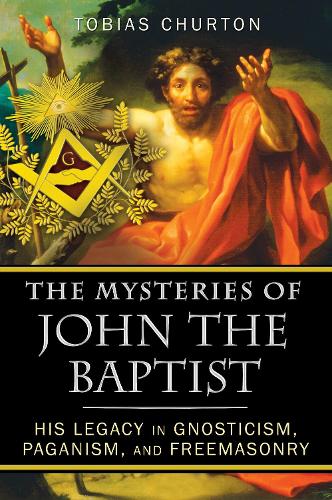
The Mysteries of John the Baptist: His Legacy in Gnosticism, Paganism, and Freemasonry
(Paperback)
Publishing Details
The Mysteries of John the Baptist: His Legacy in Gnosticism, Paganism, and Freemasonry
By (Author) Tobias Churton
Inner Traditions Bear and Company
Inner Traditions Bear and Company
24th October 2012
United States
Classifications
General
Non Fiction
Biography: religious and spiritual
Gnosticism
Autobiography: historical, political and military
B
Physical Properties
Paperback
288
Width 152mm, Height 229mm, Spine 15mm
304g
Description
The search for the real historical person known as John the Baptist and the traditions that began with him
Explores why John the Baptist is so crucially important to the Freemasons, who were originally known as St. Johns Men
Reveals how John and Jesus were equal partners and shared a common spiritual vision to rebuild Israel and overcome corruption in the Temple of Jerusalem
Explains the connections between John as lord of the summer solstice, his mysterious severed head, fertility rites, and ancient Jewish harvest festivals
Few Freemasons today understand why the most significant date in the Masonic calendar is June 24th--the Feast of the Birth of St. John the Baptist and the traditional date for appointing Grand Masters. Nor do many of them know that Masons used to be known as St. Johns Men or that John the Baptist was fundamental to the original Masonic philosophy of personal transformation.
Starting with the mystery of John in Freemasonry, Tobias Churton searches out the historical Baptist through the gospels and ancient histories, unearthing the real story behind the figure lauded by Jesuss words no greater man was ever born of woman. He investigates Johns links with the Essenes and the Gnostics, links that flourish to this day. Exposing how the apostle Paul challenged Johns following, twisting his message and creating the image of John as merely a herald of Jesus, the author shows how Paul may have been behind the executions of both John and Jesus and reveals a precise date for the crucifixion and the astonishing meaning of the phrase the third day. He examines the significance of Johns severed head to holy knights, such as the Knights Templar, and of Leonardos famous painting of John. Churton also explains connections between John, the summer solstice, fertility rites, and ancient Jewish harvest festivals.
Revealing John as a courageous, revolutionary figure as vital to the origins of Christianity as his cousin Jesus himself, Churton shows how John and Jesus, as equal partners, launched a covert spiritual operation to overcome corruption in the Temple of Jerusalem, re-initiate Israel, and resurrect Creation.
Reviews
In The Mysteries of John the Baptist, Tobias Churton has produced a remarkably fresh analysis of the herald of the Messiah. The great value of this book is that Churton provides not only a careful overview of the role of John, as handed down in Christian tradition, but gives us a unique and erudite reanalysis of the role of the Baptist using the lenses of Gnosticism, Freemasonry, and other esoteric traditions that have elevated John to a position equal to or superior to Jesus. This book is a truly invaluable addition to scholarly literature on John the Baptist. * The Reverend Jefferey Btz, S.T.M., Instructor of Religious Studies Penn State University, auth *
The Mysteries of John the Baptist is a recommended coverage for any collection interested in the mystery of John in Freemasonry and the historical Baptist as presented in the gospels and early histories...a powerful spiritual and religious survey recommended for Christian and new age holdings alike. * Midwest Book Review, February 2013 *
Mr. Churton has a deep understanding of the Gospels thanks in part to his desire to ask questions that go well beyond the accepted creed. Add to that his desire to place the Gospels in real historic and esoteric contexts, and the result is a work that deserves a spot among the most sophisticated interpretations of Jesuss era. * Marc Star, New Dawn, July 2013 *
Author Bio
Tobias Churton is Honorary Fellow of Exeter University, where he is faculty lecturer in Rosicrucianism and Freemasonry. The founding editor of the magazine Freemasonry Today, he holds a masters degree in Theology from Brasenose College, Oxford, and is the author of several books, including Gnostic Philosophy, The Magus of Freemasonry, and The Invisible History of the Rosicrucians. He lives in England.
